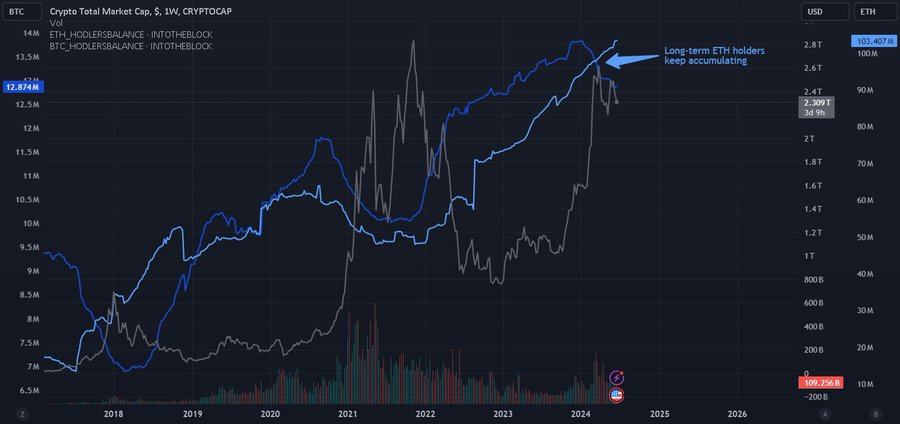Long-term Bitcoin (BTC) holders are starting to sell off holdings that were built up throughout the January bear market when the Spot Bitcoin exchange-traded fund (ETF) listed in the United States, while long-term Ethereum (ETH) holders are still accumulating.
This is according to data shared by on-chain analytics firm IntoTheBlock, which noted that the behavior of long-term holders is important in understanding market cycles, with historical data showing that “this profit-taking typically begins in the early stages of a bull market and continues well past the cycle peak.”
According to the firm, Bitcoin’s influence in the cryptocurrency space means that it is “often the most direct asset used to measure these cycles,” as other digital assets tend to follow the movements of the leading cryptocurrency.
However, one notable difference is that long-term ETH holders are still accumulating new tokens, “in stark contrast to their behavior in the last cycle, which was very similar to that of Bitcoin holders.”

IntoTheBlock notes that this departure from traditional patterns is likely driven by the emergence of attractive yield opportunities within the Ethereum ecosystem: unlike Bitcoin, Ethereum offers a staking mechanism that allows holders to earn passive income from their holdings, and there are additional yield strategies in the decentralized finance space.
Recent analysis suggests that a staggering 27.5% of the total ETH supply is currently staked, with a significant portion of that (16.3%) being reinvested through protocols like Eigenlayer, Karak Network, and Symbiotic to generate further returns.
Additionally, the possible approval of a spot-traded Ethereum ETF could also be a factor influencing the behavior of long-term holders. These investors may be waiting for this regulatory milestone and a possible price surge to all-time highs before considering selling their ETH.
The SEC last month approved an application for a spot Ethereum ETF to be listed by major stock exchanges, paving the way for these products to begin trading later this year. The approval marks a major shift for the SEC, which has historically been cautious about cryptocurrencies and is considering whether to consider the second-largest cryptocurrency a commodity or a security.
While the exchange’s application was approved, individual ETF issuers, including VanEck, ARK Investments and BlackRock, still need to get their registration statements approved by the SEC before they can begin trading.
Notably, over 83% of current ETH holders are already in profits and with further catalysts on the way, the asset could be poised for a significant upswing. Over 89% of BTC holders are currently in profits, but investors holding this cryptocurrency seem more bearish.
Featured image from Pixabay.


